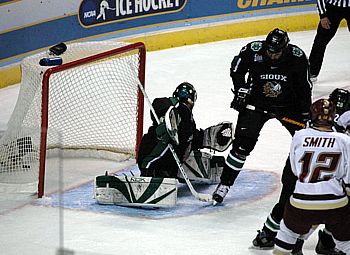The simple fact of penalty killing is that even when you’re at your best, a good effort can beat you.
North Dakota players knew what was coming Thursday night and executed accordingly, they said. Still, Boston College scored three times with the man advantage and ended the Sioux’s season.
“That’s how special teams is sometimes,” Sioux defenseman Taylor Chorney said. “You never know with that.”

It wasn’t the only cause for a 6-4 loss in the national semifinals at Scottrade Center, but it was a primary one because of the significance of the goals.
Boston College replied to North Dakota goals with a power-play score twice in the first two periods, never letting the Sioux get comfortable with a lead.
And Nathan Gerbe’s late-third-period goal gave the Eagles the lead for good, making the Eagles 3-for-7 on the power play.
“BC played great,” North Dakota senior captain Chris Porter said. “We knew what to expect coming into the game. The coaches had us prepared. We knew exactly what we were faced with. They executed what they wanted to do real well.”
Porter, playing his WCHA-record 175th consecutive game, was in the penalty box three times Thursday. On the first, BC’s Dan Bertram evened the game at 1-1. Porter was on the ice for the other two Eagles power-play goals.
“We weren’t surprised in any way,” he said. “I guess you’ve got to give some credit to them. They played a great game. Penalty kill, power play was a difference in the game. They won that battle, and I guess that’s the reason they won the game.”
Jonathan Toews, Brian Lee and Taylor Chorney also were on the penalty kill for two BC goals, partially a function of how much time they spend on the ice.
All are members of both the Sioux power play and penalty kill, and with 14 power plays between the teams Thursday, they were called on to play a significant number of minutes.
“I think what caused problems for our penalty kill tonight was fatigue,” North Dakota coach Dave Hakstol said. “At least twice tonight, we took two minor penalties in a row. That has a way of wearing down your penalty kill. Penalty killing is hard work. You have to have energy, you have to play with some speed and quickness. When you lack a little bit of energy, it’s advantage to the power play.”
The Sioux didn’t help themselves on occasion, Hakstol said.
The UND coach, who made his third Frozen Four appearance in three years in the job, pointed to two or three times his team failed to get the puck deep into the Eagles zone. That, he said, resulted in UND penalties in its defensive zone.
A pair of third-period penalties cost the Sioux. Porter was called for charging with 6:11 remaining and the Sioux down 3-2. North Dakota sophomore T.J. Oshie scored a shorthanded goal to tie the game, but just 25 seconds later, Joe Finley went to the penalty box.
It took Gerbe and the Eagles only seven seconds to take the lead again.
“We didn’t have a bad penalty kill,” Oshie said. “They were just moving the puck well and taking what we weren’t taking away. If we were doing good on the points, they made good plays in hitting the low guys. We keyed on their guy in the middle because they wanted to run the box and one. We shut him down, they gave it to the point and they got a good shot. They took what we gave them, and it’s really unfortunate that we lost the special teams battle tonight.”
UND allowed three power-play goals for the third time this season, and allowed two or more for the 12th time.
But the outing didn’t match how the Sioux got to the Frozen Four. They had killed 61 of 67 penalties (91 percent) in their last 12 games entering Thursday.
“They did a good job of making plays down low,” Chorney said of the Eagles. “The way we play our penalty kill, if people are getting shots through then things start to break down a little bit. I think that had something to do with it. They weren’t afraid to shoot the puck.
“You’ve got to give them a lot of credit. They had the same five guys out there pretty much the entire two minutes, and those are five skilled players. We had a couple chances where we could have gotten the puck out of the zone, and those things come back to bite you in the butt. I give a lot of credit to their power play.”
The North Dakota loss means the WCHA won’t have a team in the national championship game for the first time in eight years, and the league won’t win the title for the first time in six years.
The Sioux have been to three straight Frozen Fours, but they have been to the championship game only once — a loss to Denver in 2005.
“There was a lot of emotion in the locker room, especially out of our seniors,” Oshie said. “They’ve battled, they’ve been great leaders. They definitely deserved a national championship. They deserved to win tonight, and it’s real unfortunate that we couldn’t get them that.”


